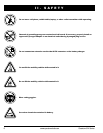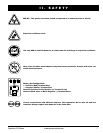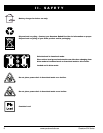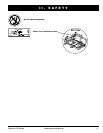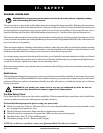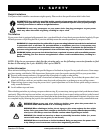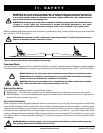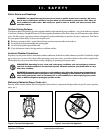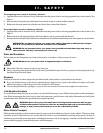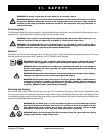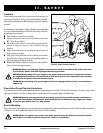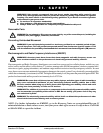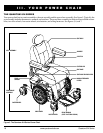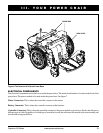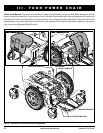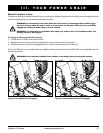
14 www.quantumrehab.com Quantum 614 Series
II. SAFETY
To navigate up over a curb or stationary obstacle:
1. Approach the curb or obstacle slowly, and make sure the power chair is traveling perpendicular to the obstacle. See
figure 2.
2. Increase the forward speed just before the front wheels come in contact with the obstacle.
3. Reduce the forward speed only after the rear wheels have cleared the obstacle.
To navigate down a curb or stationary obstacle:
1. Approach the curb or obstacle slowly, and make sure the power chair is traveling perpendicular to the obstacle. See
figure 2.
2. Reduce the forward speed just before the front wheels come in contact with the obstacle.
3. Increase the forward speed only after the rear wheels have cleared the obstacle and you are once again on a level surface.
WARNING! Do not attempt to have your power chair climb or descend an obstacle that is higher
than 2 in. (5 cm) unless you have the assistance of an attendant.
WARNING! Do not attempt to have your power chair proceed backward down any step, curb, or
other obstacle. This may cause the power chair to tip.
Stairs and Escalators
Power chairs are not designed to travel up or down stairs or escalators. Always use an elevator.
WARNING! Never use your power chair to negotiate steps or escalators.
Doors
Determine if the door opens toward or away from you.
Drive your power chair gently and slowly forward to push the door open. Or drive your power chair gently and slowly
backward to pull the door open.
Elevators
Modern elevators have a door edge safety mechanism that, when pushed, reopens the elevator door(s).
If you are in the doorway of an elevator when the door(s) begin to close, push on the rubber door edge or allow the
rubber door edge to contact the power chair and the door will reopen.
Use care that pocketbooks, packages, or power chair accessories do not become caught in elevator doors.
Lifts/Elevation Products
If you will be traveling with your power chair, you may find it necessary to use a lift/elevation product to aid in transporta-
tion. Pride recommends that you closely review the instructions, specifications, and safety information set forth by the
manufacturer of the lift/elevation product before using that product.
WARNING! Never sit on your power chair when it is being used in connection with any type
of lift/elevation product. Your power chair was not designed with such use in mind and any
damage or injury incurred from such use is not the responsibility of Pride.
Motor Vehicle Transport
Pride recommends that you do not remain seated in your power chair while traveling in a motor vehicle. The power chair
should be stowed in the trunk of a car or in the back of a truck or van with batteries removed and properly secured. In
addition, any removable power chair parts, including the armrests, seat, front riggings, controller, and shrouds should be
removed and/or properly secured during motor vehicle transport.



